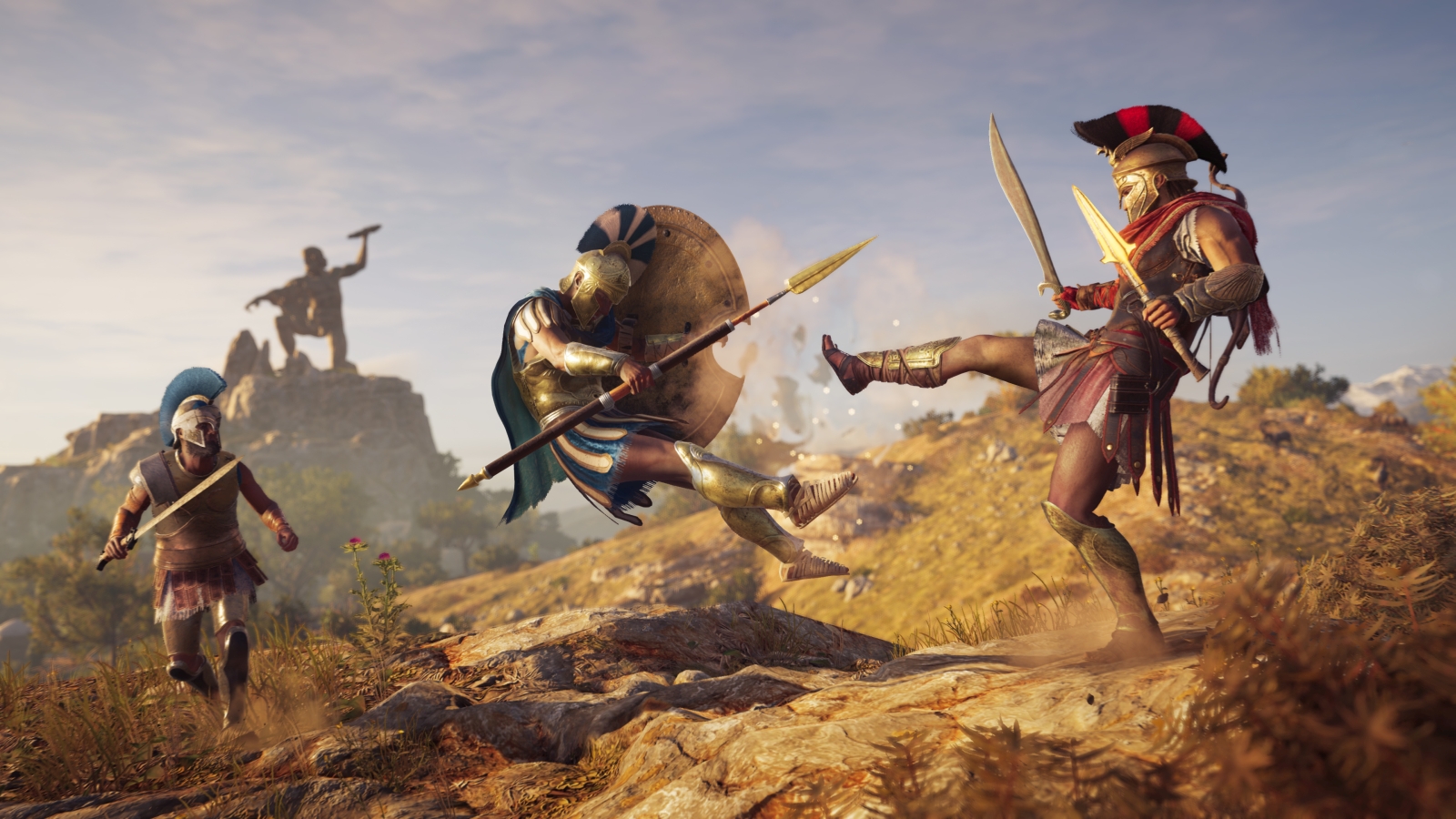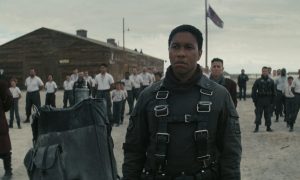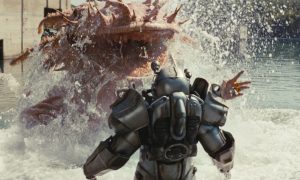After covering games for two decades you can begin to sense when a game is ready and when it’s not. As I rode over to the studio with a few of the development team members to get my final hands-on time with Assassin’s Creed Odyssey ahead of the game shipping on October 5th (the 2nd, if you pre-order) there is a quiet, albeit nervous, confidence. The game has been shown several times in the last few weeks – a pre-gamescom event, gamescom, a trip to France, and now the first real unfettered and unrestricted access to the game. A select group of press have been invited to fire up the game and go wherever their choices take them. As the Ubisoft Quebec team steps back and tentatively watches us click “New Game” and set out on our own personal Odyssey, they take a deep breath, knowing that we’ll be diving in without their hand-holding for nearly eight hours of access with nearly-final code. They are prepared to come back with their shield – with it, or on it.
This preview will focus on the first eight hours of the game, and it will have very few minor spoilers beyond the initial setup of the game. If you, like me, prefer to go in blind, you have little to fear here as I’m going to focus on the mechanical improvements and how they impact the storyline, not the storyline itself. Fret not, there are no dragons here.
As I mentioned, our Odyssey begins at the beginning, as most stories do. Previous hands-on showcases began in medias res, jumping the player a few hours into the main mission, or in our most recent look at the game, all the way to the end-game and an encounter with the mythical Medusa. The game begins with familiar sequences from antiquity (or overtones of the movie 300, if you aren’t familiar with the literal Battle of Thermopile). King Leonidas gathers his men for his final clash with Xerxes of Persia – a battle that would pass him from this mortal life and into the realms of legend. Clashing with the insurmountable odds of the Persian Empire, his blade flashes, he kicks, strikes, and stabs with discipline and fervor. While his name will live forever, unfortunately his legendary spear was lost to the ages, until now.
I don’t want to give away any of the storyline that links Odyssey to modern times, because these are often a surprising part of the story. Suffice it to say, the spear is recovered, and on it lives the DNA of not one but two ancestors of brave Leonidas – the dual protagonists of Assassin’s Creed Odyssey, and your first meaningful choice in the game; will you play as Alexios, or as Kassandra? This is also our first thread in the central pillar of family – one of the primary drivers in Odyssey.
When I sat down and talked with Mel MaCcoubrey, Narrative Director for Assassin’s Creed Odyssey, we talked a lot about choice, and how this new world features no wrong paths, only ones that create the character you will ultimately become. It was at this point that it dawned on me that this Assassin’s Creed game being described is more of an RPG than any in the series that has come before it. It was time to get some real hands-on time with what I’m affectionately dubbing “stage two” of the formula retrofit to see if it can live up to the incredibly lofty goals Ubisoft Quebec has set forth for it.
Assassin’s Creed Odyssey takes place in 431 BCE (though there are moments that flash all the way back to the formative years of the protagonist). The protagonist (I played this time as Kassandra, and will continue my review with the same choice, so assume that identity going forward) has grown up, but never realized her potential as a descendant of the King of Sparta. Instead, I find myself a poor misthios (a sword for hire, or mercenary) living in a hovel, sheltering a local orphan, and hounded by local thugs for debts. Naturally, I’m in debt because others are in debt to me, creating a vicious circle that comes around as I catch a bone-crunching loping punch to the nose by two enforcers sent by a man with the nickname of “Cyclops”. Beating them down, I see our second choice as I’m given the choice to spare them to send a message that the beatings will continue if Cyclops continues to send them to our doorstep, or to execute them where they lie to send a more aggressive message. Given that they couldn’t manage to do more than bloody my nose, I spared the two runts and sent them packing. Cause and effect reared its ugly head soon after when these two, joined by three others in reinforcement, met me on the road with revenge in their eyes.
In previous hands-on sessions with the game, we had some opportunity to try out the RPG gear-system, but much of our gear was already well-sorted by that point. Here, we are starting with almost nothing, giving us our first look at the balance and progression of this system. We saw some flavor of this in Origins, but there are some enhancements on tap.
As in Origins, you can buy upgrades for your weapons by gathering crafting materials and spending your hard-earned drachmae, the currency of the ancient Greeks. This allows you to bump up equipment that you like due to the attributes that are hard-set into them, matching them to your current level. This is very expensive, so I wouldn’t recommend doing this just because you like the look of something.
Split across eight categories (e.g. head, waist, belt, etc.), there are now more opportunities to engrave your gear than what was presented in Origins. These engraving blueprints are now unlocked through natural play (kill 20 predators with a bow, find a specific treasures, reach a level threshold, etc.), and can be applied using crafting supplies and drachmae. Common level of equipment can have a single engraving, whereas more rare and legendary, can have two or three or additional attributes applied. These can be additional armor, fire or poison damage, melee attack charge speed, and much more, again granting a great deal of player agency of choice.
We see the continuation of player choice in the skill tree, much like we did in Origins. There are 35 skills divided between Assassin, Hunter, and Warrior archetypes. Bayek’s combat was certainly explosive but Odyssey is a different kettle of fish. Kassandra fights like a Spartan, descended from King Leonidas himself, and that means providing the player with attacks like the Charged Heavy Attack, Bull Rush, Battlecry of Ares, and of course, the signature Spartan Kick. It creates an explosive, bombastic fighting style that is far more aggressive than anything we’ve seen in the series to date. All of that said…this is once again, a personal choice.
On the other side of the drachmae is the hunter and assassin skills, and they are equally as powerful. Poison, using the shadows, and unleashing the mystical spear of Leonidas, are some of the tools you’ll use to strike from the darkness. You’ll be able to unleash a triple-shot from your bow, slow time, vanish from sight, and yes…even unleash a volley of arrows to force your enemies to try to “fight in the shade”.
One of my favorite new additions to the Assassin’s Creed playbook is a new mode. Typically, when you are given a quest objective, you are also provided a marker on the map to chase it down. Now, right after choosing between four difficulty levels, you can choose between Guided Mode (where markers are displayed at all times) and Exploration mode. Exploration mode provides general locations of things instead of specifics (“The Captain will meet you east of the city of Phokis” or “We believe he’s nearby a cave at the southern edge of the island”), allowing the player to explore without so much hand-holding. This small change made the open world, which is already 2.5x larger than the massive play space of Origins, feel even larger and more mysterious.
As you explore the island, uncovering quests and opportunities, you are constantly exposed to the new approach to narrative engagement that the team has taken with Odyssey. Moving from traditional linear storytelling to, as they’ve phrased it, “choice driven interactive cinematic storytelling”, Ubisoft Quebec is pushing engagement and player decision into every interaction. As such, there are over 30 hours of new dialogue choices in the game, pushing the play time into eye-popping “over 100 hours” territory.
To help flesh out the player-choice mechanic, the team built Alexios and Kassandra with a base personality, rather than creating an empty template. They are both short tempered, passionate, emotional, and occasionally rash people with their own innate drivers baked in. Where you take them from this point is entirely your choice — your Odyssey. Combined with the new dialogue system, this enables new mechanics like a romance system or even the opportunity to have a philosophical debate with the likes of Socrates. During my play time I had an opportunity at a sapphic romantic interlude with an NPC who needed my help. Unfortunately I hadn’t done enough to earn her affection, resulting in her rebuffing my ham-fisted attentions — another first for the previously-linear title.
It’d be easy to see Kephallonia as the “tutorial island” as the developers slowly introduce you to the new mechanics of the game. I was happy to see that this wasn’t the case. Instead it feels like a natural part of the world, slowly granting you increased access to mechanics without making progression feel artificial. You’ll gain a horse, you’ll be introduced to mercenaries (more on them in a minute, because they are awesome), you’ll earn levels, pick up gear, earn new powers, and begin to develop the character you want to be. These are minor things, but they make such a big impact in keeping you immersed in the world.
We got to see mercenaries briefly in our pre-gamescom coverage, but with less than two hours of game time, we didn’t get to see their impact. Shortly into dealing with Cyclops and his gang on Kephallonia you run into your first mercenary — a man named Talos the Stone Fist. There are nine tiers of mercenaries that are hand-crafted with special gear, powers, and occasionally pets roaming the world. They act as enforcers, handling problems you might create such as theft (you no longer can simply take objects from every box in the world — they aren’t yours, after all) and murder. Murder is often defined by the side you support, meaning you’ll be seeing a lot of these 50 mercenaries. When you start running afoul of their perception of the law, they will begin to hunt you. With a Grand Theft Auto-esque 5-star-like system, they’ll begin to send one, two, three, four, or even five of these well-equipped and powerful mercenaries after you. Killing them is once again murder, worsening the problem. It creates a pressure that you can be ambushed at any point, spoiling your best laid plans. I’ve been in the middle of a well-planned base assault and had these free-roaming shock troops decide that now might be a good time to see if they could put my head on a pike.
There is a new, albeit familiar, mechanic for Odyssey that ties into the larger Peloponnesian War (the 30 year war between Sparta and Athens). If you’ve played games like Tom Clancy’s Ghost Recon: Wildlands you’ll be familiar with the concept of weakening a specific area to draw out a boss for an encounter. Here, you are weakening nation states by killing soldiers from the other side, burning their war supplies, pillaging their treasures, and dispatching their captains. Unlike Wildlands, you also have the option to simply try to cut the head from snake by attacking the Nation Leader immediately. However, if you take this approach, you’ll face a far tougher foe, and one likely surrounded by powerful allies and dangerous reinforcements. Once again, the power of choice.
We got to spend a little more time with naval combat in this extended hands-on preview of the game as well, though the marine battles really only begin after events unfold on the island of Megaris — the first potential stop in the open world. While basic rowers are supplied with your ship (How you arrive by your own vessel is yours to discover), trusted lieutenants must be recruited. Rather than killing soldiers, you can knock them unconscious and concript them into your service. Your ship, the Adrestia, has four crew positions for these lieutenants, and each will add their own statistical bonuses to arrow, spear, ramming, fire brazier, and other attack or defensive capabilities. These lieutenants are ever present on your ships, and will join you during any boarding sequences. In addition, the Call to Arms ability lets you summon these lieutenants to fights on land for a short span.
The ship’s combat mechanics are more about timing and position than having the right ammunition on hand, as it was in games like Black Flag and Rogue. As a result, ramming to expose critical points, using spears while close, and arrows from afar make for a more frantic combat than I’m describing. The combat is far more close quarters and personal than before, and boarding sequences bear this out. As the ships are more flat and narrow, close quarters combat is more dangerous and tight. I’m looking forward to exploring this more, but from what I’ve seen so far, it feels fresh and new.
As much as Assassin’s Creed Odyssey is a story about mythical assassins and their connection to the sci-fi precursors, it’s far more a story about family, humor, and tragedy — all thematic elements ever-present in Grecian life and lore. If you step off the beaten path and take out a group of bandits in a cave, exiting through the rear, you’ll come upon a woman praying to a statue of Hermes, the protector and patron of roads and travelers. You can choose to turn a deaf ear to her prayers, letting this moment between her and her God pass quietly, or you can pretend to be Hermes and “answer her prayer”. If you choose to speak on behalf of Hermes, stating “You will find riches at your door sooner than you expect!”, it will expose a secondary and entirely optional quest down the line. The results aren’t always positive or negative, but there are always consequences to your choices, and it’ll be fun to contend with those.
I’ll close this already-long preview (which admittedly only scratches the surface) with a final quick example that sums up my time with choice and consequences in Odyssey. Your battle with nation states often culminates with a massive engagement with hundreds of friends and foes clashing on the battlefield. During a sequence early in the game, I had chosen to spare a combatant, advising them to go live a long and fruitful life away from all of this conflict. Unfortunately, they had different choices in mind, rejoining the enemy army as a lieutenant. As my time with the game reached its culmination I found myself engaged in battle with the Nation Leader commander, as well as this familiar foe. After a brutal battle with both foes, my decision had come back to haunt me, but their decision had ultimately cost them their lives.
Assassin’s Creed Origins was an incredible reboot to the franchise, and Assassin’s Creed Odyssey improves so many important elements that it’s hard to even quantify all of it, even in a preview as long as this. As I packed up my gear and headed back to the airport to head home, I did find one gigantic problem with the game…I’ll have to wait another four weeks to see where all of these amazing stories will lead.
Assassin’s Creed Odyssey is coming to Xbox One, Xbox One X, PlayStation 4, PlayStation 4 Pro, and PC on October 5th, with early access for pre-orders opening up on October 2nd. Look for our full review on PC, as well as our continued coverage ahead of that time.
Ron Burke is the Editor in Chief for Gaming Trend. Currently living in Fort Worth, Texas, Ron is an old-school gamer who enjoys CRPGs, action/adventure, platformers, music games, and has recently gotten into tabletop gaming.
Ron is also a fourth degree black belt, with a Master's rank in Matsumura Seito Shōrin-ryū, Moo Duk Kwan Tang Soo Do, Universal Tang Soo Do Alliance, and International Tang Soo Do Federation. He also holds ranks in several other styles in his search to be a well-rounded fighter.
Ron has been married to Gaming Trend Editor, Laura Burke, for 28 years. They have three dogs - Pazuzu (Irish Terrier), Atë, and Calliope (both Australian Kelpie/Pit Bull mixes), and an Axolotl named Dagon!

See below for our list of partners and affiliates:

























